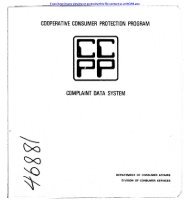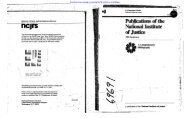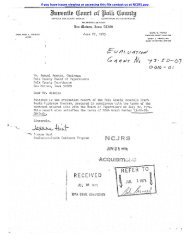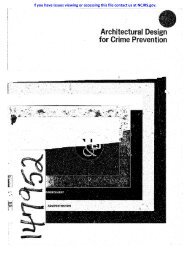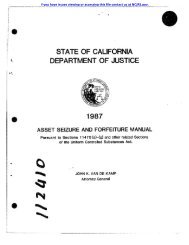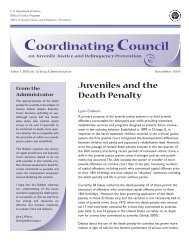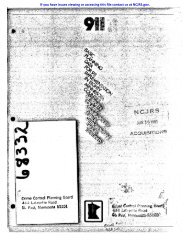Conflict Resolution Education - National Criminal Justice Reference ...
Conflict Resolution Education - National Criminal Justice Reference ...
Conflict Resolution Education - National Criminal Justice Reference ...
You also want an ePaper? Increase the reach of your titles
YUMPU automatically turns print PDFs into web optimized ePapers that Google loves.
will take the risk of applying when they do not fear<br />
rejection. It is also important that students not have<br />
a negative experience with the peer mediation program.<br />
Lottery selection is perceived as an opportunity,<br />
whereas selection by criteria can be perceived<br />
as a personal risk. A student rejected as a peer<br />
mediator may reject the mediation process if he or<br />
she later experiences a conflict. This attitude can<br />
potentially spread from one individual to groups of<br />
peers, who would then also refuse to participate in<br />
the mediation. The lottery must also provide for the<br />
proper representation of the school’s diverse groups<br />
if it is to work well.<br />
Even some of the tougher kids are starting to<br />
see fighting as pretty stupid.<br />
Middle school mediator, Champaign, Illinois<br />
The IIDR program for student mediation training<br />
involves 12 to 15 hours of basic training and 12 to<br />
15 hours of additional advanced training. The basic<br />
training activities include understanding conflict,<br />
responses to conflict, sources of conflict, communication<br />
skills, the role of the mediator, and the<br />
mediation process. The advanced training includes<br />
bias awareness, social/cultural diversity, advanced<br />
communication, uncovering hidden interests, dealing<br />
with anger, caucusing, negotiation, and group<br />
problem solving.<br />
Students who complete the basic training can mediate<br />
most disputes between peers. The advanced<br />
training strengthens their abilities to use the mediation<br />
process and expands their understanding of<br />
diversity with regard to conflict resolution.<br />
Phase IV: Educate a Critical Mass<br />
The fourth phase of the program focuses on educating<br />
a critical mass about conflict, conflict resolution,<br />
and the mediation process via workshops for faculty,<br />
students, parents, and the community. In the IIDR<br />
program, the staff inservice training is a minimum<br />
of 6 hours. The purpose of the inservice training is<br />
30<br />
to help the staff develop a common understanding<br />
of conflict, learn the principles of conflict resolution,<br />
develop an understanding of the mediation process,<br />
learn how to support the development of the peer<br />
mediation program through curriculum integration<br />
and referral of conflicts to mediation, and prepare<br />
to conduct student workshops.<br />
Workshops for students last about 5 hours and<br />
are designed to develop an understanding of conflict,<br />
peace, and peacemaking; communication and<br />
negotiation skills; and an understanding of peer<br />
mediation and procedures for requesting peer mediation<br />
services. Student peer mediators are often<br />
used to provide orientation programs for and assist<br />
in training faculty, students, parents, and community<br />
groups.<br />
Phase V: Develop and Execute a<br />
Promotional Campaign<br />
The fifth phase consists of developing and executing<br />
a promotional campaign. Like many new ideas, peer<br />
mediation can be greeted with skepticism. Students<br />
may be reluctant to try a new approach. Many students<br />
may feel as if they are backing down or losing<br />
face if they talk problems through. Promoting the<br />
program among the student population is crucial<br />
to its success, but the campaign activities must be<br />
revived periodically and continue through the life<br />
of the program.<br />
There are so many more problems today<br />
that they naturally affect our kids. They<br />
need ways to deal with their own problems.<br />
Parent, Chicago, Illinois<br />
Phase VI: Program Operation and<br />
Maintenance<br />
Phase VI encompasses every aspect of program<br />
operation and maintenance—requesting mediation,<br />
scheduling mediations and mediators, supervising<br />
mediators, recording mediation data, providing



